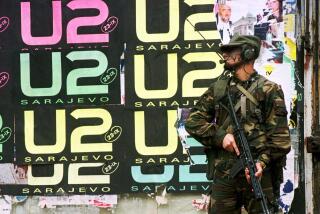Commentary / PERSPECTIVE ON INTERVENTION :...
- Share via
A harried man interrupted a meeting I attended at UNESCO in New York earlier this month. He had opened the door to the wrong conference room, stumbled into a conversation about the crisis of African illiteracy instead of joining the discussion of European civil strife where he was scheduled to speak. For a few moments he failed to realize his mistake--after all, we were just another assembly of dark suits around an oval table, our faces made serious by defeating statistics, our yellow legal pads covered with the usual question marks--and so he launched into his prepared report.
“I’m just back from Sarajevo,” the official announced in a vaguely British accent. “Haven’t slept much. We were driving supply trucks for four days. Never saw anything like it. Every street where we stopped became a target. Mortars coming out of nowhere. Could have been either side shooting. Both. Anything that moves is the enemy. Anything that stands still.”
He glanced at a map on the wall, registered that it was Mali and not Bosnia, closed his eyes briefly and made to leave.
“Wait,” asked the chair of our committee. “What’s it like over there? What can you tell us?”
We put down our pencils, focused hard, waited while the man made three false starts, breaking off each time as he tried to find a beginning to the story.
“The thing is,” he said finally, “you can’t tell them apart. They’re all Slavs. Same eyes, same build. Divided by accidents of history, by whose ancestors got invaded by Austrians, whose by Turks. By whose mother gave her son a cross to wear around his neck, whose mother gave a crescent moon.”
The man’s eyes were bright with the exhaustion that comes from seeing too much, from absorbing without the temperance of words more than the human brain can process and organize. How could he explain to us a situation he didn’t himself fathom, how could he unleash into the civility of a quiet room a storm of hatred that from the outside seems clearly senseless and from within drowns out the voice of every rational thought? How to describe the force of a nightmare to men and women fortunate enough, at least for now, to be awake?
How to persuade that concern without the follow-through of succor was no concern at all? How to persuade us to get up and join him behind the wheel?
More to Read
Sign up for Essential California
The most important California stories and recommendations in your inbox every morning.
You may occasionally receive promotional content from the Los Angeles Times.













